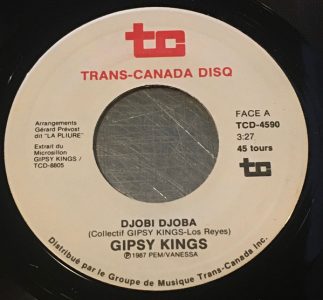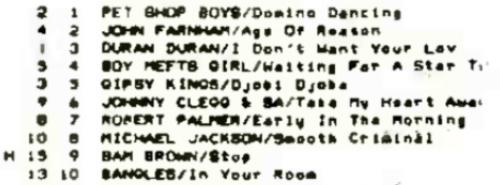#46: Djobi Djoba by the Gypsy Kings
City: Montreal, PQ
Radio Station: CKOI
Peak Month: December 1988
Peak Position in Montreal ~ #3
Peak position in Vancouver ~ did not chart
Peak Position on Billboard Hot 100 ~ did not chart
Peak Position on French (FR) Singles Chart ~ #3
Peak Position on Dutch Singles chart ~ #12
YouTube: “Djobi Djoba”
Lyrics: “Djobi Djoba”
The Gipsy Kings (gipsy no “y” ) were formed in 1979, and originally called Los Reyes. It consisted of Nicolas Reyes on lead vocals, Tonino Baliardo on lead guitar, Chico Bouchikhi on guitar, André Reyes on rhythm guitar and backing vocals, Pablo Reyes on guitar and backing vocals, Max Baliardo on rhythm guitar, and Diego Baliardo on rhythm guitar and handclaps. Prior to the formation of the Gipsy Kings, Nicolas, André, Pablo and Patchaï Reyes played in Los Reyes with their father José Reyes. Tonino, Max and Diego Balairdo are sons of flamenco guitarist Ricardo Baliardo who was known as Manitas de Plata. Ricardo Baliardo was born in 1921 in a gypsy caravan in southern France. Chico Bouchikhi was born in 1954 in Arles, France, to a father who came from Morocco. Bouchikhi married a daughter of José Reyes named Marthe Reyes.
When José Reyes died in 1979, the Reyes brothers were joined by their cousins the Balairdo brothers, and their brother-in-law Chico Bouchikhi to become the Gipsy Kings. (Reyes in Spanish means King). Traveling around France and playing at weddings, festivals, and in the streets as a gypsy band, they adopted the moniker Gipsy Kings, with Nicolas as lead vocalist and Tonino on lead guitar. Later, they were hired to play at upper-class parties in such places as Saint-Tropez. The Gipsy Kings have a Catalan heritage and play a blend of Catalan rumba, first developed in Barcelona’s Romani community in the 1950s. The music is a fusion of flamenco rumba, rock and roll and Cuban music.
Flamenco is an art form based on the various folkloric music traditions of southern Spain, developed within the gitano subculture of the region of Andalusia, and also having historical presence in Extremadura and Murcia. In a wider sense, the term is used to refer to a variety of both contemporary and traditional musical styles typical of southern Spain. Flamenco is closely associated to the gitanos of the Romani ethnicity who have contributed significantly to its origination and development. However, its style is uniquely Andalusian and flamenco artists have historically included Spaniards of both gitano and non-gitano heritage.
“Flamenco” is also a synonym for gitano (as is Romani). The origins of the term, flamenco, lie in the sociological prejudice towards the Roma. They were seen as ruffians and cocky troublemakers by the Spaniards and were thus associated with the 18th century German colonists of the Sierra Morena who formed groups of urban Bohemians that lived outside the law and were seen as idle and lazy.
The first use of the term Flamenco to refer to the music genre appears in a 1847 newspaper article of El Espectador where it was referred to as a “Gitano genre.” In the early years of Flamenco, the term was versatile and was used to refer to a variety of concepts in the Gitano-Andalusian world. For example, in the 1860s-70s this versatility was exemplified through its use to refer to a musical style and a certain aesthetic, manners, and way of life that were perceived to be Gitano. At that time, Flamenco was not a strict genre but a way of performing music in a Gitano-Andalusian style.
In 1982 they released their debut album Allegria. A second acoustic guitar album, Luna de Fuego, was released to little fanfare in 1983.
In 1987, the band released a self-titled album Gipsy Kings. From the album they released “Bamboléo” as their debut single. The song climbed to #5 in the Netherlands, #7 in France, #12 in Austria, #18 in West Germany, #19 in Australia, and #23 in Belgium. Their next single release was “Djobi Djoba”.

Originally, “Djobi Djoba” was released as an acoustic single from their debut album in 1982. At the time the song got little notice. The song was written by the group. The song is about a guy who recalls, “I met you alone on the street and fell in love with you. I feel sad when I’m alone.
Djobi Djoba may be Creole for “Look, I saw (found out that every day I love you more).” It may be the Spanish “Yo vi, yo va” standing for “I saw I’m going to (love you more each day).” So the chorus can be translated, “Look, I saw (you) and I’m going to love you more each day.” The second verse details, “I don’t mind the the distance that already separates us. I am content with you. Don’t tell me to stop (loving you) now.” (Some Spanish to English translation sites offer that that last line in verse two is translated from “Paragua ya, ya, yay” to “Don’t tell me Paraguayan, ya, ya, yay.” In this less likely translation, this would mean the distance between them is literally a long physical distance as if the guy is from [or presently living in] Paraguay).
“Djobi Djoba” peaked at #3 in Montreal. Internationally, the single reached #3 in France, #12 in the Netherlands, and also charted in Australia.
Gipsy Kings peaked at #2 on the Australian album chart, #3 in France, #10 in Switzerland, #14 in Norway, #16 in the UK, and #20 the Austrian and New Zealand album charts, and #22 in the Netherlands. A track from the Gipsy Kings, “Bem bem Maria”, charted in Australia.
In 1989, the group released Mosaïque. A track from the album, “Vamos a bailar”, shot to #3 on the Billboard Hot Latin 50 chart. Also from the album, the Gipsy Kings cover of “Volare” was a Top 30 hit in Belgium, France, Italy and Spain. It also topped the Hot Latin 50 chart in the USA in 1989.
In 1990, the Gipsy Kings won the Victoires de la Musique Award in France for Group of the Year.
In 1991, a compilation album titled Rubáiyát included a Spanish-English language cover of the Eagles’ “Hotel California”. It climbed to #7 in Spain. The song was featured in the 1998 soundtrack for the Coen brothers film The Big Lebowski.
Later that year, the group released the studio album Este Mundo. The album topped the charts in the Netherlands and Switzerland. The album was nominated for a Grammy Award for Best Global Music Album. From the album came “Baila me”, which reached #5 in the Netherlands, #7 in Belgium, #13 in Spain, and #16 in Germany. The single was also popular in France and Switzerland.
In 1994, Love and Liberté was nominated for a Grammy Award for Best Global Music Album. In 1997, Tierra Gitana (1996) – US version of Estrellas – was nominated for a Grammy Award for Best Global Music Album. In 1998, Compas was nominated for a Grammy Award for Best Global Music Album.
On the Billboard World Album chart the Gipsy Kings topped the chart with Mosaïque (1989-90) Love and Liberté (1993), Estrellas (1995), Compas (1997), Somos Gitanos (2001), Roots (2004), and Savor Flamenco (2013). In 2014, Savor Flamenco won a Grammy Award for Best Global Music Album. Over the years the lineup of the group has been a mix of original members and some newer musicians.
Over the years, the Gipsy Kings have released thirteen studio albums. While their hit singles tampered off into the early 1990s, “Ciclone” was a number-one hit in Italy in 2020. It also reached #9 in San Marino. The single was a collaboration between the Gipsy Kings and the Italian duo Takagi & Ketra. In 2021, their single “Ingobernable” reached number-one in Spain. Lead singer, Nicolas Reyes, has written a memoir titled Becoming A King.
Nicolas Reyes and Tonino Baliardo are original founding members of the Gipsy Kings who are still with the group.
André Reyes performs with his own band, under the name Gipsy Kings by André Reyes. The group consists of André and a number of his relatives, including his son Thomas, his nephews Kakou and Tambo, his brother Patchaï, and his first cousin Mario, as well as four backing musicians. Patchaï Reyes performs as Gitano Family with his son. Founding member Chico Bouchikhi tours with his band Chico & the Gypsies. They have released fourteen albums since 1992.
Tonino Baliardo released an instrumental album in 2001, titled Essences. He followed it two years later with Tonino Baliardo. In 2023, he issued Renaissance, under the name of his touring band, Gipsy Kings featuring Tonino Baliardo. In 2022, Nicolas Reyes and Moroccan musician Saad Lamjarred collaborated to pay tribute to King Mohammed VI on Throne Day, releasing a song called “Viva El Rey Habibna”.
May 28, 2025
Ray McGinnis
References:
“Gipsy Kings,” RFI Music.com, November 2013.
Cristina Cruces-Roldán, “Flamenco,” pp. 249-306 in David Horn and Paulo Prato (editors, Bloomsbury Encyclopedia of Popular Music of the World Volume 11, (Bloomsbury, 2017).
“The History of Rumba Catalana,” rumbacatalana.com.
Jenny Jones, Gipsy Kings, “Hotel California“, The Big Lebowski, 1991.
Nicolas Reyes, Becoming A King,

CKOI 96.9 FM Montreal (PQ) Top Ten | December 23, 1988

Leave a Reply